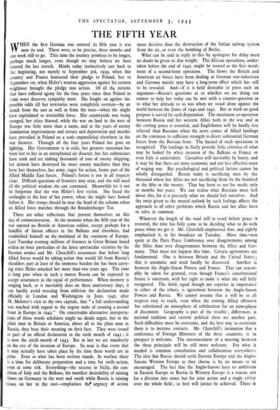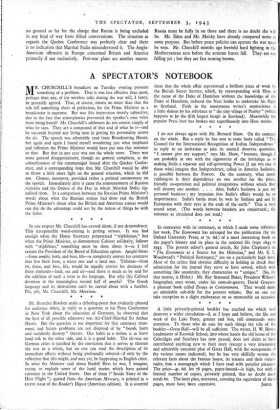THE FIFTH YEAR
WHEN the first German war- entered its fifth year it was near its end. There were, to be precise, three months and one week still to go. This time the journey promises to be longer, perhaps much longer, even though we may believe we have entered the last stretch. Minds today instinctively cast back to the beginning, not merely to September 3rd, 1939, when this country and France honoured their pledge to Poland, but to September 1st, when Hitler's.wanton aggression against his eastern neighbour brought the pledge into action. Of all the nations that have suffered agony for the four years since then Poland in some ways deserves sympathy most. She fought on against im- possible odds till her territories were completely overrun—by an attack from the east as well as from the west—when she might have capitulated to irresistible force. Her countryside was being ravaged, her cities blasted, while the war on land in the west of Europe was little more than a name, and in the years of enemy domination imprisonment and torture and deportation and murder have prevailed in Poland on a scale unparalleled elsewhere in the war theatres. Through all the four years Poland has gone on fighting. Her Government is in exile, her greatest statesman has been lost to her in an unexplained air disaster, but her submarines have sunk and are sinking thousands of tons of enemy shipping, her airmen have destroyed far more enemy machines than they have lost themselves, her army, eager for action, forms part of the Allied Middle East forces. Poland's future is not in all respects clear. Difficult questions of frontiers may arise, and she will need all the political wisdom she can command. Meanwhile let it not be forgotten that' she was Hitler's first victim. She faced the onslaught to the best of her power, when she might have bowed before it. Her troops should be near the head of the column when an Allied force marches through the Brandenburger Tor.
There are other reflections that present themselves on this day of commemoration. At the moment when the fifth year of the war opened no British or American soldier, except perhaps- for a haridful of liaison officers in the Balkans and elsewhere, had established himself on the mainland of the continent of Europe. Last Tuesday evening millions of listeners in Great Britain heard within an hour particulars of the latest spectacular victories by the Russian armies and Mr. Churchill's assurances that before long Allied forces would be taking action that would lift from Russia's shoulders part at least of the immense burden she has been carry- ing since Hitler attacked her more than two years ago. The time is long past when in such a matter Russia can be expected to accept assurances as the equal of performance. When memory is ranging back, as it inevitably does on these anniversary days, it can hardly avoid rescuing from oblivion the declaration made officially in London and Washington in June, 1942, after M. Molotov's visit to the two capitals, that " a full understanding was reached with regard to the urgent tasks of creating a second front in Europe in 1942." On conceivable alternative interpreta- tions of those words scholiasts might no doubt argue, but to the plain man in Britain or America, above all to the plain man in Russia, they bear their meaning on their face. They were issued as part of an official declaration in the sixth month of 1942 ; it is now the ninth month of 1943. But at last we are manifestly on the eve of the invasion of Europe. So near is that event that it may actually have taken place by the time these words are in print. Even so what has been written stands. In warfare there is a time for deliberate preparation and a time for swift. action, even at some risk. Everything—the success in Sicily, the con- dition of Italy and, the Balkans, the manifest desirability of raining blows on Germany in the west and south while Russia is raining • blows on her in the east—emphasises the* urgency of action more decisive than the destruction of the Italian railway system ' from the air, or even the bombing of Berlin.
What can be said in reply to this by apologists for delay must no doubt be given its due weight. The African operations, under- taken before the end of 1942, might be treated as the first instal- ment of a second-front operation. The blows the British and American air forces have been dealing at German war-industries and German morale may have a long-term effect which has still to be revealed. And—if it is held desirable to press such an argument—Russia's questions as to whether we are doing our utmost to help her today can be met with a counter-question as to what her attitude to us was when we stood alone against the world between the Junes of 1940 and 1941. But in truth no good purpose is served by such disputation. The maximum co-operation between Russia and her western Allies both in the war and in the coming peace is essential, and Englishmen will be hardly less relieved than Russians when the news comes of Allied landings on the continent in sufficient strength to divert substantial German forces from the Russian front. The hazard of such operations is recognised. The landings in, Sicily provide little criterion of what may be looked for when invasion of the Balkans or France or even Italy is undertaken. Casualties will inevitably be heavy, and it may be that there are more economic and not less effective ways of waging war. But psychological and political factors cannot be wholly disregarded. Russia today is sacrificing men by the thousand where her Allies are not sacrificing them by the hundred or the fifty or the twenty. That has been so not for weeks only or months but years. We can realise what Russians must feel. about this, for it is precisely what we should feel ourselves. And the twist given to the mental outlook by such feelings affects the approach to all other problems which Russia and her allies have to solve in common.
Whatever the length of the road still to tread before peace is restored, the time has fully come to be deciding what to do with peace when we get it. Mr. Churchill emphasised that, and rightly emphasised it, in his broadcast on Tuesday. More time-was spent at the Paris Peace Conference over disagreements among the Allies than over disagreements between the Allies and Ger- many. That must not happen this time. Certain agreements are fundamental. One is between Britain and the United States ; that is axiomatic and need hardly be discussed. Another is between the Anglo-Saion Powers and France. That can reason- ably be taken for granted,_ though France's constitutional future is uncertain, with her right to make it what she will fully recognised. The third, equal though not superior in importance to either of the others, is agreement between the Anglo-Saxon Powers and Russia. We cannot assume that it will be in all respects easy to reach, even when the coming Allied offensive has substituted an atmosphere of exhilaration for an atmosphere of discontent. Geography is part of the trouble ; differences in national tradition and current political ideas are another part. Such difficulties must be overcome, and the best way to overcome them is to increase contacts. Mr. Churchill's intimation that a conference of Foreign Ministers of the three countries is in prospect is welcome, The announcement of a meeting between the three principals will be still more welcome. For what is needed is common consultation and collaboration everywhere. The idea that Russia should settle Eastern Europe and the Anglo- Saxons Western Europe as they choose is by no means to be encouraged. The fact that the Anglo-Saxons have no ambitions in Eastern Europe or Ruska in Western Europe is a reason, not for a division into zones but for joint action and a single rolicy over the whole field ; so best will justice be achieved. There is



























 Previous page
Previous page